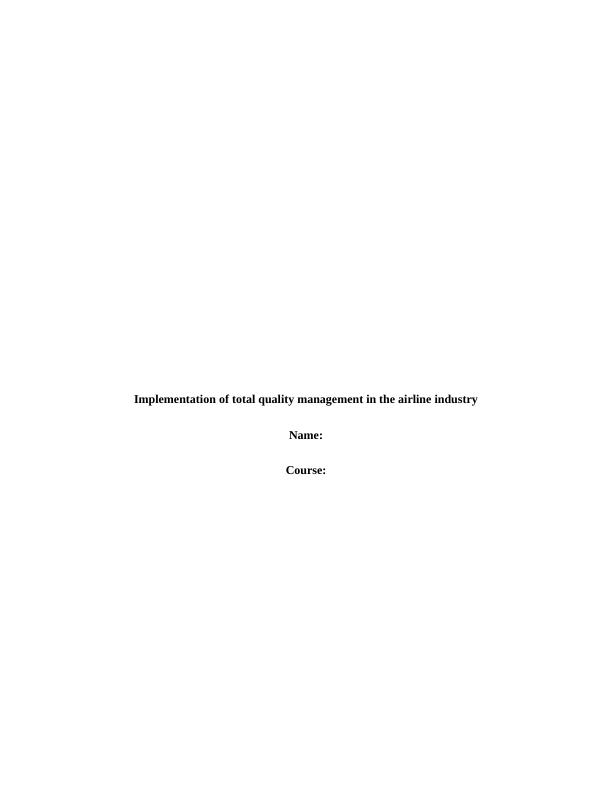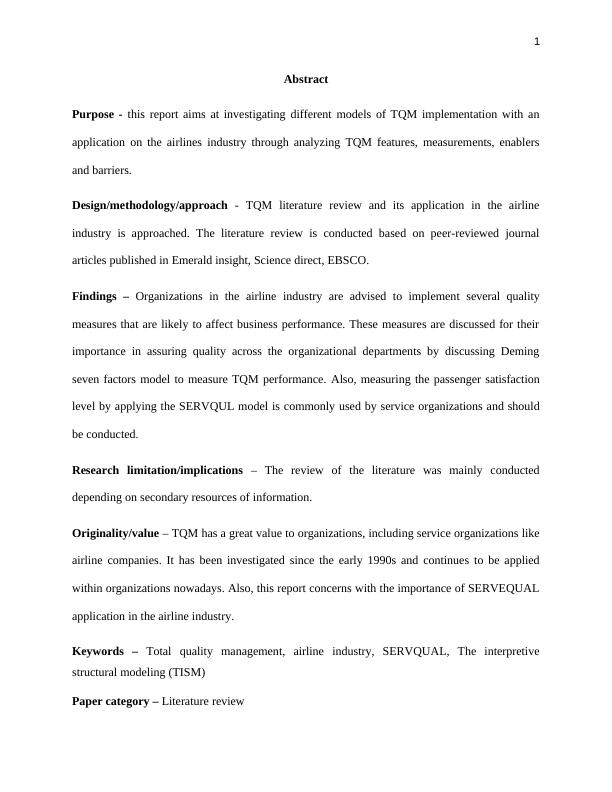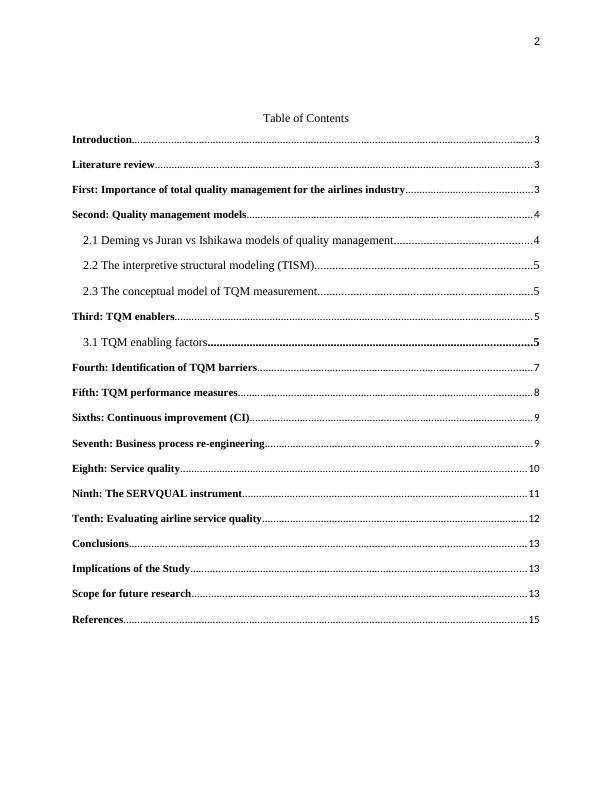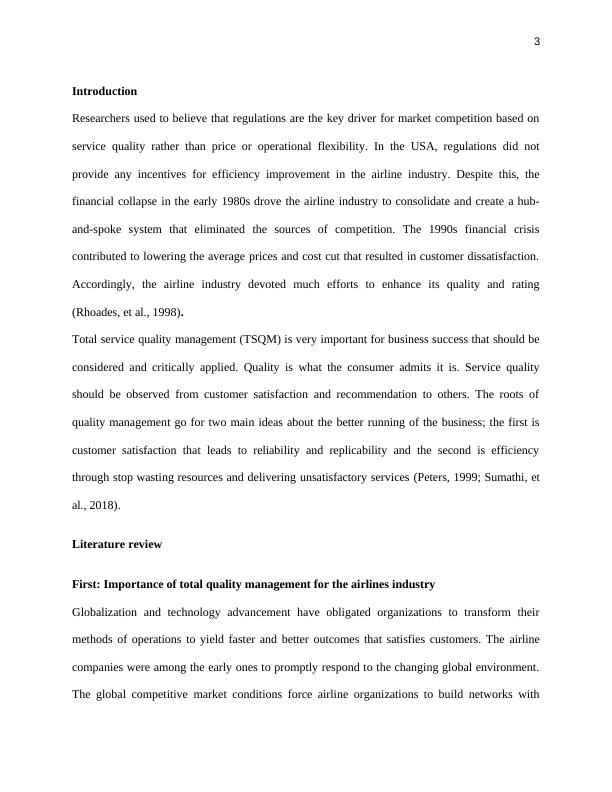Implementation of Total Quality Management in the Airline Industry
18 Pages3775 Words151 Views
Added on 2023-04-08
About This Document
This report investigates the implementation of Total Quality Management (TQM) in the airline industry. It discusses the importance of TQM, different TQM models, enablers, barriers, and performance measures. The report emphasizes the need for continuous improvement and the application of the SERVQUAL model in the airline industry.
Implementation of Total Quality Management in the Airline Industry
Added on 2023-04-08
ShareRelated Documents
Implementation of total quality management in the airline industry
Name:
Course:
Name:
Course:

1
Abstract
Purpose - this report aims at investigating different models of TQM implementation with an
application on the airlines industry through analyzing TQM features, measurements, enablers
and barriers.
Design/methodology/approach - TQM literature review and its application in the airline
industry is approached. The literature review is conducted based on peer-reviewed journal
articles published in Emerald insight, Science direct, EBSCO.
Findings – Organizations in the airline industry are advised to implement several quality
measures that are likely to affect business performance. These measures are discussed for their
importance in assuring quality across the organizational departments by discussing Deming
seven factors model to measure TQM performance. Also, measuring the passenger satisfaction
level by applying the SERVQUL model is commonly used by service organizations and should
be conducted.
Research limitation/implications – The review of the literature was mainly conducted
depending on secondary resources of information.
Originality/value – TQM has a great value to organizations, including service organizations like
airline companies. It has been investigated since the early 1990s and continues to be applied
within organizations nowadays. Also, this report concerns with the importance of SERVEQUAL
application in the airline industry.
Keywords – Total quality management, airline industry, SERVQUAL, The interpretive
structural modeling (TISM)
Paper category – Literature review
Abstract
Purpose - this report aims at investigating different models of TQM implementation with an
application on the airlines industry through analyzing TQM features, measurements, enablers
and barriers.
Design/methodology/approach - TQM literature review and its application in the airline
industry is approached. The literature review is conducted based on peer-reviewed journal
articles published in Emerald insight, Science direct, EBSCO.
Findings – Organizations in the airline industry are advised to implement several quality
measures that are likely to affect business performance. These measures are discussed for their
importance in assuring quality across the organizational departments by discussing Deming
seven factors model to measure TQM performance. Also, measuring the passenger satisfaction
level by applying the SERVQUL model is commonly used by service organizations and should
be conducted.
Research limitation/implications – The review of the literature was mainly conducted
depending on secondary resources of information.
Originality/value – TQM has a great value to organizations, including service organizations like
airline companies. It has been investigated since the early 1990s and continues to be applied
within organizations nowadays. Also, this report concerns with the importance of SERVEQUAL
application in the airline industry.
Keywords – Total quality management, airline industry, SERVQUAL, The interpretive
structural modeling (TISM)
Paper category – Literature review

2
Table of Contents
Introduction...............................................................................................................................................3
Literature review.......................................................................................................................................3
First: Importance of total quality management for the airlines industry.............................................3
Second: Quality management models......................................................................................................4
2.1 Deming vs Juran vs Ishikawa models of quality management..............................................4
2.2 The interpretive structural modeling (TISM).........................................................................5
2.3 The conceptual model of TQM measurement........................................................................5
Third: TQM enablers................................................................................................................................5
3.1 TQM enabling factors............................................................................................................5
Fourth: Identification of TQM barriers..................................................................................................7
Fifth: TQM performance measures.........................................................................................................8
Sixths: Continuous improvement (CI).....................................................................................................9
Seventh: Business process re-engineering................................................................................................9
Eighth: Service quality............................................................................................................................10
Ninth: The SERVQUAL instrument......................................................................................................11
Tenth: Evaluating airline service quality...............................................................................................12
Conclusions..............................................................................................................................................13
Implications of the Study........................................................................................................................13
Scope for future research........................................................................................................................13
References................................................................................................................................................15
Table of Contents
Introduction...............................................................................................................................................3
Literature review.......................................................................................................................................3
First: Importance of total quality management for the airlines industry.............................................3
Second: Quality management models......................................................................................................4
2.1 Deming vs Juran vs Ishikawa models of quality management..............................................4
2.2 The interpretive structural modeling (TISM).........................................................................5
2.3 The conceptual model of TQM measurement........................................................................5
Third: TQM enablers................................................................................................................................5
3.1 TQM enabling factors............................................................................................................5
Fourth: Identification of TQM barriers..................................................................................................7
Fifth: TQM performance measures.........................................................................................................8
Sixths: Continuous improvement (CI).....................................................................................................9
Seventh: Business process re-engineering................................................................................................9
Eighth: Service quality............................................................................................................................10
Ninth: The SERVQUAL instrument......................................................................................................11
Tenth: Evaluating airline service quality...............................................................................................12
Conclusions..............................................................................................................................................13
Implications of the Study........................................................................................................................13
Scope for future research........................................................................................................................13
References................................................................................................................................................15

3
Introduction
Researchers used to believe that regulations are the key driver for market competition based on
service quality rather than price or operational flexibility. In the USA, regulations did not
provide any incentives for efficiency improvement in the airline industry. Despite this, the
financial collapse in the early 1980s drove the airline industry to consolidate and create a hub-
and-spoke system that eliminated the sources of competition. The 1990s financial crisis
contributed to lowering the average prices and cost cut that resulted in customer dissatisfaction.
Accordingly, the airline industry devoted much efforts to enhance its quality and rating
(Rhoades, et al., 1998).
Total service quality management (TSQM) is very important for business success that should be
considered and critically applied. Quality is what the consumer admits it is. Service quality
should be observed from customer satisfaction and recommendation to others. The roots of
quality management go for two main ideas about the better running of the business; the first is
customer satisfaction that leads to reliability and replicability and the second is efficiency
through stop wasting resources and delivering unsatisfactory services (Peters, 1999; Sumathi, et
al., 2018).
Literature review
First: Importance of total quality management for the airlines industry
Globalization and technology advancement have obligated organizations to transform their
methods of operations to yield faster and better outcomes that satisfies customers. The airline
companies were among the early ones to promptly respond to the changing global environment.
The global competitive market conditions force airline organizations to build networks with
Introduction
Researchers used to believe that regulations are the key driver for market competition based on
service quality rather than price or operational flexibility. In the USA, regulations did not
provide any incentives for efficiency improvement in the airline industry. Despite this, the
financial collapse in the early 1980s drove the airline industry to consolidate and create a hub-
and-spoke system that eliminated the sources of competition. The 1990s financial crisis
contributed to lowering the average prices and cost cut that resulted in customer dissatisfaction.
Accordingly, the airline industry devoted much efforts to enhance its quality and rating
(Rhoades, et al., 1998).
Total service quality management (TSQM) is very important for business success that should be
considered and critically applied. Quality is what the consumer admits it is. Service quality
should be observed from customer satisfaction and recommendation to others. The roots of
quality management go for two main ideas about the better running of the business; the first is
customer satisfaction that leads to reliability and replicability and the second is efficiency
through stop wasting resources and delivering unsatisfactory services (Peters, 1999; Sumathi, et
al., 2018).
Literature review
First: Importance of total quality management for the airlines industry
Globalization and technology advancement have obligated organizations to transform their
methods of operations to yield faster and better outcomes that satisfies customers. The airline
companies were among the early ones to promptly respond to the changing global environment.
The global competitive market conditions force airline organizations to build networks with

End of preview
Want to access all the pages? Upload your documents or become a member.
Related Documents
PEV302 Total Quality Management for the Events Sectorlg...
|15
|3451
|40
Total Quality Managementlg...
|10
|2794
|146
Quality Management in EasyJet Airlinelg...
|19
|4507
|399
Total Quality Management Assignment Solutionlg...
|15
|3138
|38
Quality Assurance Fundamentals Essay 2022lg...
|8
|1629
|20
Impact of Service Quality on Customer Satisfaction in Malaysia Airlineslg...
|4
|729
|56
